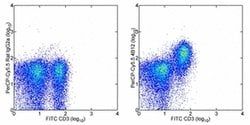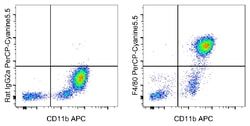CD197 (CCR7) Monoclonal Antibody (4B12), PerCP-Cyanine5.5, eBioscience™, Invitrogen™
Rat Monoclonal Antibody
Manufacturer: Fischer Scientific
The price for this product is unavailable. Please request a quote
Antigen
CD197 (CCR7)
Concentration
0.2 mg/mL
Classification
Monoclonal
Form
Liquid
Regulatory Status
RUO
Formulation
PBS with 0.09% sodium azide; pH 7.2
Gene Alias
BLR2; Bukitt's lymphoma receptor 2; CC chemokine receptor 7; C-C chemokine receptor type 7; C-C CKR-7; C-C motif chemokine receptor 7; CC-CKR-7; CCR7; CCR-7; CD197; CDw197; chemokine (C-C motif) receptor 7; chemokine (C-C) receptor 7; Cmkbr7; EBI1; Ebi1h; EBV-induced G protein-coupled receptor 1; EBV-induced G-protein coupled receptor 1; Epstein-Barr virus induced gene 1; Epstein-Barr virus-induced G-protein coupled receptor 1; EVI1; lymphocyte-specific G protein-coupled peptide receptor; MIP-3 beta receptor
Gene Symbols
Ccr7
Primary or Secondary
Primary
Content And Storage
4° C, store in dark, DO NOT FREEZE!
Gene
Ccr7
Clone
4B12
Applications
Flow Cytometry
Conjugate
PerCP-Cyanine5.5
Host Species
Rat
Target Species
Mouse
Gene Accession No.
P47774
Gene ID (Entrez)
12775
Isotype
IgG2a κ
Purification Method
Affinity chromatography
Product Type
Antibody
Description
- Description: The 4B12 monoclonal antibody reacts with mouse CCR7, also known as EBI-1 and CD197
- CCR7 is a chemokine receptor for the chemokines CCL19 (CKβ11, ELC, MIP3β, Scya19, Exodus-3) and CCL21 (CKβ9, SLC, MIP2β, Scya21, Exodus-2)
- In recent years, the role of chemokines in directing the migration of lymphocytes has been well-characterized
- One of the most important mediators of homeostatic trafficking of naive T cells to secondary lymphoid organs (SLO) is the chemokine receptor CCR7
- Binding of its ligands, CCL19 and CCL21, mediates the trans endothelial migration of T cells across high endothelial venules into SLO
- It has also been demonstrated that CCR7 plays a role in the localization of dendritic cells and B cells during an immune response
- CCR7 is a chemokine receptor for the chemokines CCL19 (CKβ11, ELC, MIP3β, Scya19, Exodus-3) and CCL21 (CKβ9, SLC, MIP2β, Scya21, Exodus-2)
- In addition to its significant role in the chemotaxis of lymphocytes, human CCR7 has also been recognized as a marker for a distinct subset of memory T cells, the central memory (TCM) population
- These cells are characterized by the expression of CCR7 and CD62L and reside within peripheral lymphoid organs
- CCR7 also plays a role in thymocyte development and its deficiency leads to disturbed thymic architecture, aberrant T cell development, and limited thymocyte expansion
- CCR7 is a member of the G protein coupled receptor family, which is a subfamily of chemokines
- CCR7 was identified to be induced by the Epstein Barr virus (EBV), and is thought to be a mediator of EBV effects on B lymphocytes
- CCR7 has been reported to be expressed in blood, bone marrow, lymph node, and intestine
- CCR7 is particularly expressed in lymphoid tissues and in activated B and T lymphocytes and has been shown to control the migration of memory T cells to inflamed tissues, as well as stimulate dendritic cell maturation
- The chemokine (C-C motif) ligand 19 (CCL19/ECL) has been reported to be a specific ligand of this receptor
- ESTs have been isolated from blood, embryo, lymph node, and thymus libraries
- Receptors for the C - C chemokine family include CCR 1, CCR 2A, CCR 3, CCR 4, CCR 5 and the Duffy blood group antigen
- The C-C receptors are important in the function of T cell chemotaxis and migration of phagocytic cells to sites of inflammation.



